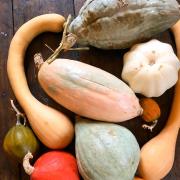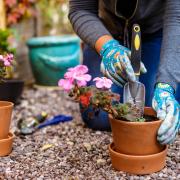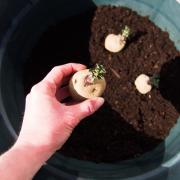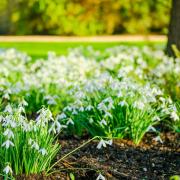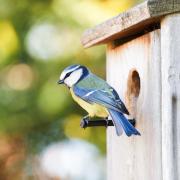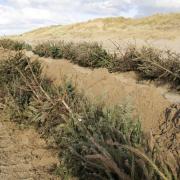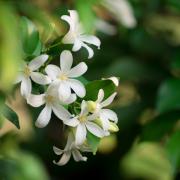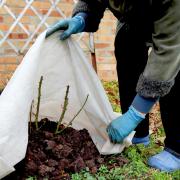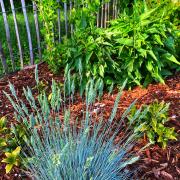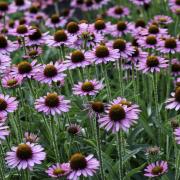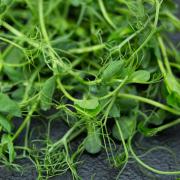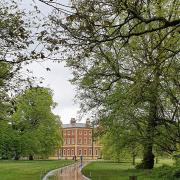Peter and Edith Cordall have devoted over 50 years of their lives to this global garden.

WHO?
Peter Cordall spent three years in the Antarctic before returning as a science teacher, specialising in biology. He and Edith met when she worked as a technician in the College of Education in Chorley. Edith’s father gave them a plot of land as a wedding present 56 years ago, and the first brick for the house was laid on their wedding day. Since then they have created this beautiful global garden on the derelict orchard.
Peter’s love of walking led to trekking and plant hunting around the world. One of his most interesting trips was with the Alpine Garden Society to Siberia, as part of the first British Botanical Party to have visited that country for 100 years. One of his last trips was to Afghanistan. Although he is now 90-years-old, his passion for growing plants from seed hasn’t waned and he still gives talks locally including on plant photography.
Now 80, Edith developed her love of plants as a child on the farm where she was raised and on walks with her mother.
WHAT AND WHERE?
The one acre garden has been created from scratch from the derelict orchard in the Mawdesley countryside. It has different areas, with a traditional garden to one side of the house and a secret garden sheltered with trees, shrubs and plants laced with winding paths. There is a seated area full of artefacts and two rockeries, one more traditional and the other a crevice rockery.
WHAT’S GROWING?
One of the first tasks was to plant pine trees to shelter them from the prevailing winds which come straight over from Southport.
‘The one drawback is the thousands of fir cones we have to gather up,’ Edith says. ‘But they do make good kindling and I’ve used others to fill wire baskets which I hang from trees to make homes for insects.’
Roses and other climbing plants are trained up a pergola under which Edith has planted her favourite flowers, species lillies, in a collection of pots as they don’t do well in the garden.
The tranquil sound of water comes from a couple of small fountain features which lead to the focal point of a pottery monolith. Edith loves art and works at Cedar Farm in the framing and picture gallery. Among the other works on display around the garden are pieces by one of her favourite sculptors, Christine Cummings, who has much of her work on display here, a statue they bought on a visit to RHS Harlow Carr Gardens in Harrogate and a group of monolith rocks.
In the ‘secret’ garden area there are many plants grown from seeds Peter has collected which have matured into large specimens.
A huge crack willow, believed to have stemmed from a fence post many years ago, now stands over 60 feet making a statement in this area. Giving a spectacular show in autumn is the Tupelo tree, which gave its name to the town where Elvis Presley was born. There are some rare finds around the garden, including a mature Ginko tree. Native to China, they have been found in fossils dating back 270 million years.
WHY IS IT SPECIAL?
Peter and Edith both wanted plants they knew would grow in the wild but would then thrive in a Lancashire garden which is why they like species ones. By growing from seed you can get more plants and trees without spending a lot of money, creating a lovely garden that develops over time.
‘Recently the wrong tree
was accidentally felled but once we had got over the shock it opened up a large area which let in light and gave us the opportunity to plant up a new area,’ Edith says. ‘So good does come out of bad sometimes.’
They usually open their garden as part of the village open gardens and also for small groups which is something they will miss this year.
TOP TIPS
If there is a space in your garden, pop in a plant. Staking tall plants early on before they start to grow ensures their supports will be hidden. Also a wire hanging basket placed upside down over a growing plant whether in a pot or in the ground makes a great support. Netting is ideal to keep rabbits from munching your plants. Making your own obelisk is not as difficult as you may imagine, give it a go - there are instructions online.
WHAT CAN YOU TRY?
Grow more plants from seed, and try the more unusual ones, you may not be able to go
plant hunting but there are many specialist suppliers. It
can be rewarding and certainly give you more plants for your money, there is nothing more magical than seeing a seed germinate and grow. Try growing a tree to leave for generations to come.
Clever use of artefacts add another dimension and swapping and sharing plants is a great way to build up a collection, even more so in the lockdown. Don’t forget to support your local nurseries and garden centres who at the time of writing are starting to open.




